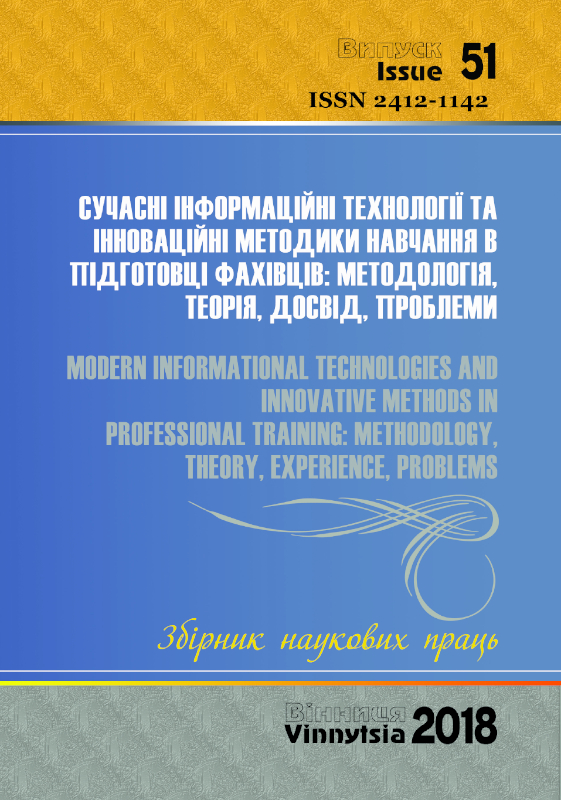TO THE PROBLEM OF THE ESSENCE OF MEANINGFUL PERSONALITY VALUES
Keywords:
novation, innovation, innovative pedagogical activity, readiness, readiness to innovative pedagogical activity, self-appraisalAbstract
Readiness to innovation becomes especially important in preschool educational institutions. The
theoretical analysis of the essence of the concept of «readiness to innovative pedagogical activity» points to the
researchers' multidimensional approaches. These approaches relate to the identification of certain essential features
of such readiness, respectively, the wording formulation of the concepts is complementary. The readiness to
innovation, the focus on improving their own pedagogical activity and the activities of the entire teaching staff is
analyzed by researchers. The structural components of such readiness are motivational, cognitive, procedural,
reflexive. The tutor's preschool institutions сreativity is of great importance. Self-appraisal of readiness to innovative
pedagogical activity can be considered as the goal and result of the process of self-knowledge, the complex self-
analysis of the individual regarding the ability to create, implement and disseminate pedagogical innovations.
Self-appraisal of tutors of their readiness to innovative pedagogical activity was conducted. Almost one third
of the respondents rated their readiness within the range of 75-92 % of the maximum. The most problematic qualities
of innovation, which most of the respondents of preschool establishmets have noted are: the ambition for leadership;
independence of statements; the ability to abandon stereotypes in pedagogical activity; possession of methods of
pedagogical research; the ability to create an author's concept, technology of activity; the ability to organize a
pedagogical experiment, etc. Most tutors of preschool institutions are ready to introduce innovations of other tutors more than their creation.
Downloads
References
Гавриш І. В. Теоретико-методологічні основи формування готовності майбутніх учителів до інноваційної діяльності: автореф. дис. на здобуття наук. ступеня докт. пед. наук: спец. 13.00.04 «Теорія та методика професійної освіти» / І. В. Гавриш. – Луганськ, 2006. – 44 с.
Гончарова О. А. Педагогічні умови підготовки майбутнього вчителя іноземної мови до інноваційної діяльності: автореф. дис. на здобуття наук. ступеня канд. пед. наук: спец. 13.00.04 «Теорія та методика професійної освіти» / О. А. Гончарова. – К., 2008. – 20 с.
Дичківська І.М. Інноваційні педагогічні технології: Навч. посіб. / І. М. Дичківська. К.: Академвидав, 2004. – 352 с.
Дічек Н. Педагогічне новаторство як історико-педагогічна проблема: підходи до вивчення / Н. Дічек // Рідна школа. – 2009. – N 10. – С. 40-44.
Козак Л. В. Структурно-компонентна модель підготовки майбутнього викладача дошкільної педагогіки і психології до інноваційної професійної діяльності / Л. В. Козак // Педагогічний процес: теорія і практика. – 2013. – N 2. – С. 98-110.
Огієнко О. І. Формування готовності до інноваційної діяльності як важлива складова професійної підготовки майбутнього вчителя / О. І. Огієнко // Педагогічні науки: теорія, історія, інноваційні технології. – 2013. – Т. 7. – N 33. – С. 154-162.
Професійна педагогічна освіта: інноваційні технології та методики: монографія; за ред. О. А. Дубасенюк. – Житомир: Вид-во ЖДУ ім. I. Франка, 2009. – 504 с.
Сластенин В. А. Педагогика: Инновационная деятельность / В. А. Сластенин, Л. С. Подымова. – М.: Магистр, 1997. –224 с.
Смолеусова Т. В. Состояние профессиональной готовности учителей начальной школы к внедрению инноваций / Т. В. Смолеусова // Вестник НГПУ. – 2012. – T. 7. – N 3. – С. 5-17.
Downloads
Published
Issue
Section
License
Copyright (c) 2018 В. І. Староста, О. В. Гошко

This work is licensed under a Creative Commons Attribution 4.0 International License.

